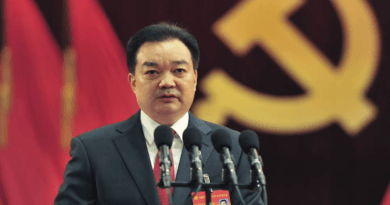TCHRD Condemns China’s Alarming Use of Enforced Disappearances, Demands Answers

DHARAMSALA, 30 Aug: Enforced disappearance, a reprehensible practice in violation of human rights, has cast a shadow over the lives of Tibetans living under Chinese occupation, the Tibetan Centre for Human Rights and Democracy (TCHRD) has said while condemning China for weaponising enforced disappearance to suppress dissent and opposition within Tibet.
Commemorating the International Day of the Victims of Enforced Disappearances, the Dharamsala-based rights group released a video highlighting the disturbing practice of enforced disappearances by the Chinese authorities in Tibet, particularly focusing on Residential Surveillance at a Designated Location (RSDL), and the grave consequences faced by Tibetan intellectuals, educators, environmental activists, monastics, and ordinary citizens.
“The current situation is grave, affecting thousands of Tibetans daily, TCHRD said and added that on the International Day of the Victims of Enforced Disappearances, “we stand in solidarity with the victims and their families in Tibet.’
The 17th May 2023 marked the 28th anniversary of the 11th Panchen Lama, Gendun Choekyi Nyima’s arbitrary detention by the Chinese government. TCHRD maintained that apart from the 11th Panchen Lama who was abducted at the age of 6 along with his family and Chadrel Rinpoche, the former abbot of Tashi Lhunpo Monastery and head of the search committee of the 10th Panchen Lama by the Chinese Communist Party China often weaponises enforced disappearance to suppress dissent and opposition within Tibet.
“At least one thousand known Tibetans have disappeared following the March 2008 uprising in Tibet and many more of all ages, genders and occupations continue to disappear every year.”
The centre added that In Tibet, Chinese authorities weaponised enforced disappearance to suppress and silence any opposition and dissent within Tibet. “Enforced disappearances entail secret abductions, arrests, or detentions carried out by Chinese authorities without due legal process.”
“These incidents often occur under the pretext of “national security” or suppressing “separatist” movements, leaving families in despair and communities in terror.
The disappearances, TCHRD said are commonly executed under the pretext of “national security” or to suppress “separatist” movements, effectively erasing any trace of those who dare to raise their voices for basic human rights, justice, and freedom.”
The United Nations Committee on the Elimination of Racial Discrimination (CERD) has previously expressed serious concerns over these mass violations of the rights of Tibetans, Uyghurs and Southern Mongolians.
TCHRD highlighted that “In the past decade, out of 20 communications on Tibet received by the UN Human Rights Council, seven involved cases of enforced disappearances of over 50 individuals whose whereabouts remain unknown following their detention.”
On 17 February 2022, the UN Human Rights experts and bodies have raised their concerns regarding the arrests, detention and subsequent enforced disappearance of Tibetan writer Mr Lobsang Dhondup, Musician Mr Lhundup Drakpa, and teacher Miss Rinchen Kyi in connection with their cultural activities advocating for Tibetan language and culture
TCHRD called for the help of the international community to put an end to enforced disappearances and the RSDL system under the Chinese government. It stresses the imperative for the international community to pay attention to these cases and raise its voice against such human rights violations.
TCHRD called upon the UN High Commissioner for Human Rights, along with the working groups and committees on enforced disappearance, to put an end to RSDL in Tibet. It further urged the international community to hold the Chinese Communist Party (CCP) accountable for its actions.
TCHRD also addressed the “CCP to condemn their actions and demand the immediate release of current political prisoners while putting an end to the practice of RSDL under its rule.”
Underscoring the essential aspects of a fair trial, transparency, and respect for individuals’ rights, TCHRD called for the protection of human rights and support for those striving to preserve their culture, traditions, and identity.
“We ask the CCP a simple question, Where are they?”
TCHRD has also organized a panel discussion that included former Tibetan political prisoners Gendun Rinchen, Ngawang Woebar, Geshe Tsering Dorje, and human rights researcher Wangden Kyab. The discussion centred on China’s illicit utilization of “enforced disappearance.”
Collectively, the panel emphasized that laws hold little practical significance under Chinese rule, serving more as theoretical concepts while China frequently exploits them to stifle dissent and quell opposition.
International Day of the Victims of Enforced Disappearances was established by the UN General Assembly resolution 65/209 of December 21, 2010, and observed since 2011.
The day is being observed to express deep concern about the rise in enforced or involuntary disappearances in different regions of the world including the incidents of arrest, detention and abduction
Enforced disappearance is frequently used as a strategy to spread terror within the society. The feeling of insecurity generated by this practice is not limited to the close relatives of the disappeared but also affects their communities and society as a whole.
Though China has been a signatory to the Convention on the Elimination of All Forms of Racial Discrimination since 1981, China is a leading country that resorts to enforced disappearances to silence minorities’ attempts to speak out for their rights.





